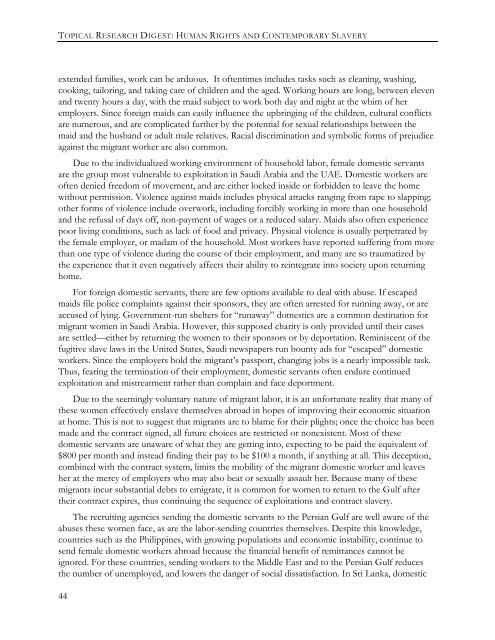Slavery in The 21st Century
Slavery in The 21st Century
Slavery in The 21st Century
You also want an ePaper? Increase the reach of your titles
YUMPU automatically turns print PDFs into web optimized ePapers that Google loves.
TOPICAL RESEARCH DIGEST: HUMAN RIGHTS AND CONTEMPORARY SLAVERY<br />
extended families, work can be arduous. It oftentimes <strong>in</strong>cludes tasks such as clean<strong>in</strong>g, wash<strong>in</strong>g,<br />
cook<strong>in</strong>g, tailor<strong>in</strong>g, and tak<strong>in</strong>g care of children and the aged. Work<strong>in</strong>g hours are long, between eleven<br />
and twenty hours a day, with the maid subject to work both day and night at the whim of her<br />
employers. S<strong>in</strong>ce foreign maids can easily <strong>in</strong>fluence the upbr<strong>in</strong>g<strong>in</strong>g of the children, cultural conflicts<br />
are numerous, and are complicated further by the potential for sexual relationships between the<br />
maid and the husband or adult male relatives. Racial discrim<strong>in</strong>ation and symbolic forms of prejudice<br />
aga<strong>in</strong>st the migrant worker are also common.<br />
Due to the <strong>in</strong>dividualized work<strong>in</strong>g environment of household labor, female domestic servants<br />
are the group most vulnerable to exploitation <strong>in</strong> Saudi Arabia and the UAE. Domestic workers are<br />
often denied freedom of movement, and are either locked <strong>in</strong>side or forbidden to leave the home<br />
without permission. Violence aga<strong>in</strong>st maids <strong>in</strong>cludes physical attacks rang<strong>in</strong>g from rape to slapp<strong>in</strong>g;<br />
other forms of violence <strong>in</strong>clude overwork, <strong>in</strong>clud<strong>in</strong>g forcibly work<strong>in</strong>g <strong>in</strong> more than one household<br />
and the refusal of days off, non-payment of wages or a reduced salary. Maids also often experience<br />
poor liv<strong>in</strong>g conditions, such as lack of food and privacy. Physical violence is usually perpetrated by<br />
the female employer, or madam of the household. Most workers have reported suffer<strong>in</strong>g from more<br />
than one type of violence dur<strong>in</strong>g the course of their employment, and many are so traumatized by<br />
the experience that it even negatively affects their ability to re<strong>in</strong>tegrate <strong>in</strong>to society upon return<strong>in</strong>g<br />
home.<br />
For foreign domestic servants, there are few options available to deal with abuse. If escaped<br />
maids file police compla<strong>in</strong>ts aga<strong>in</strong>st their sponsors, they are often arrested for runn<strong>in</strong>g away, or are<br />
accused of ly<strong>in</strong>g. Government-run shelters for “runaway” domestics are a common dest<strong>in</strong>ation for<br />
migrant women <strong>in</strong> Saudi Arabia. However, this supposed charity is only provided until their cases<br />
are settled—either by return<strong>in</strong>g the women to their sponsors or by deportation. Rem<strong>in</strong>iscent of the<br />
fugitive slave laws <strong>in</strong> the United States, Saudi newspapers run bounty ads for “escaped” domestic<br />
workers. S<strong>in</strong>ce the employers hold the migrant’s passport, chang<strong>in</strong>g jobs is a nearly impossible task.<br />
Thus, fear<strong>in</strong>g the term<strong>in</strong>ation of their employment, domestic servants often endure cont<strong>in</strong>ued<br />
exploitation and mistreatment rather than compla<strong>in</strong> and face deportment.<br />
Due to the seem<strong>in</strong>gly voluntary nature of migrant labor, it is an unfortunate reality that many of<br />
these women effectively enslave themselves abroad <strong>in</strong> hopes of improv<strong>in</strong>g their economic situation<br />
at home. This is not to suggest that migrants are to blame for their plights; once the choice has been<br />
made and the contract signed, all future choices are restricted or nonexistent. Most of these<br />
domestic servants are unaware of what they are gett<strong>in</strong>g <strong>in</strong>to, expect<strong>in</strong>g to be paid the equivalent of<br />
$800 per month and <strong>in</strong>stead f<strong>in</strong>d<strong>in</strong>g their pay to be $100 a month, if anyth<strong>in</strong>g at all. This deception,<br />
comb<strong>in</strong>ed with the contract system, limits the mobility of the migrant domestic worker and leaves<br />
her at the mercy of employers who may also beat or sexually assault her. Because many of these<br />
migrants <strong>in</strong>cur substantial debts to emigrate, it is common for women to return to the Gulf after<br />
their contract expires, thus cont<strong>in</strong>u<strong>in</strong>g the sequence of exploitations and contract slavery.<br />
<strong>The</strong> recruit<strong>in</strong>g agencies send<strong>in</strong>g the domestic servants to the Persian Gulf are well aware of the<br />
abuses these women face, as are the labor-send<strong>in</strong>g countries themselves. Despite this knowledge,<br />
countries such as the Philipp<strong>in</strong>es, with grow<strong>in</strong>g populations and economic <strong>in</strong>stability, cont<strong>in</strong>ue to<br />
send female domestic workers abroad because the f<strong>in</strong>ancial benefit of remittances cannot be<br />
ignored. For these countries, send<strong>in</strong>g workers to the Middle East and to the Persian Gulf reduces<br />
the number of unemployed, and lowers the danger of social dissatisfaction. In Sri Lanka, domestic<br />
44

















